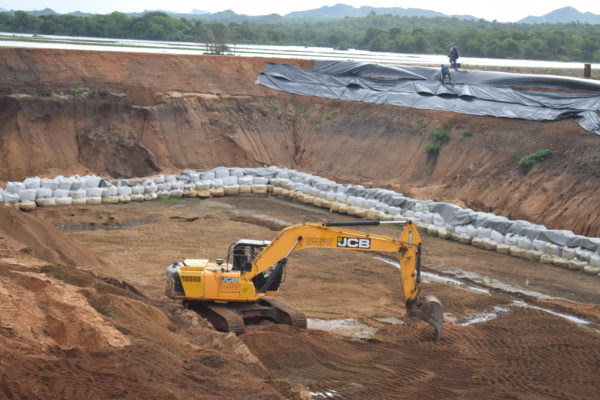Large Scale Irrigation: 'Help' from the Oppressor?
Last week I focused on the traditional small-scale irrigation methods used by farmers. This week my blog will seek to explore how larger-scale methods have been adopted (perhaps not as successfully as first thought).
Sub-Saharan Africa is heavily reliant on agriculture. It is an important employer, providing jobs to 60% of its residents and accounting for a total of 23% of the region's GDP. Africa is unique in the sense that over 90% of its food production is dependent on rainfall. This means that droughts here are likely to result in famines. As climate change becomes more extreme, the frequency and magnitude of such droughts in the tropics increases. Because of this, many NGOs and Western development agencies have pushed for the construction of large-scale irrigation techniques in a trend known as the 'New Green Revolution' The World Bank is one agency that has promoted this via neo-colonialist policies that tried to influence African development following independence. Small-scale methods were considered unable to keep up with demand, thus leading to them 'requiring' Western assistance, a common rhetoric found when discussing development and aid for the Global South.
Irrigation has huge potential in helping increase agricultural production in Africa. This would help ease off reliance on the unpredictable rainfall and push the continent towards food security. However, as mentioned above, the construction of such irrigation techniques is littered with neo-colonial rhetoric of the Global South needing Western support. The claims that these 'modern' methods are far superior to traditional techniques is where the problem lies. Dismissal of local, indigenous knowledge has been a common theme throughout history, and this is no exception. Westerners do not understand the intricacies of local landscapes and expect the same methods to work here. This is not the case. As such, many have criticised these projects as exacerbating power imbalances between African farmers and White aid providers. These white donors create an environment where farmer's become completely dependent on them for development, thus continuing the cycle of loss of agency that has systematically occurred since colonial times. These projects are a new way for colonial powers to exert control over their former subjects, rendering their independence and emancipation irrelevant. These projects have been inaccurately described as beneficial, feeding into the 'white saviour' complex wherein White people wrongly assume they are able to help people in the Global South due to their complexion, despite having no expertise to accomplish this.
The Shire Valley Project
There are countless examples of where these projects have failed to achieve their intended goals. The 1940s British-led Shire Valley Project is one example of this. It aimed to regulate water levels in Lake Malawi and harness its hydro-electric potential. Initially, the project failed as a result of local Malawian farmers resisting these colonialist practices. They viewed the project as extremely restrictive and were therefore against it. This, along with the high costs involved in its construction ultimately meant that plans never went ahead.
 |
| Figure 1: Recent Development of the Shire Valley Transformation Project. |
However, in recent times, the World Bank has restarted the previously abandoned project. Rebranded as the Shire Valley Transformation Project, it aims to commercialise agricultural production via increasing productivity. It even led to amendments in Malawian law to allow for the privatisation of irrigation systems. Despite this change, private investment did not come. This was due to the fact that the prospective crop chosen for agricultural production was not valuable enough, thereby rendering investment in its production not profitable enough either. Therefore the Malawian government had to invest itself.
In addition to these problems, the spread of Covid-19 in 2020 further hindered the project. Travel restrictions meant that only 5% of the equipment needed managed to enter Malawi. The required people were also unable to enter the country.
It is clear to see how this Western interventionist project has done nothing to improve water and food security in Malawi. Neo-colonialist attempts by the World Bank to restart the project failed because of a lack of investment. Hence, this supposedly essential 'help' from the West has achieved no improvements for Malawi. This trend is seen throughout Africa, with Western NGOs forcing development projects upon local communities, but never fulfilling the goals or training up locals to do the jobs. Despite these obvious flaws, these projects are still seen as the pinnacle of modernity. In fact, the small-scale methods previously discussed have done more to help local communities, while remaining sustainable.
It was interesting reading about the Shire Project in this post. I wondered if you know the reasons as to why farmers viewed the project as restrictive?
ReplyDeletehey emma, I think the farmers felt too controlled and were unwilling to have their work dictated to such a degree
Delete